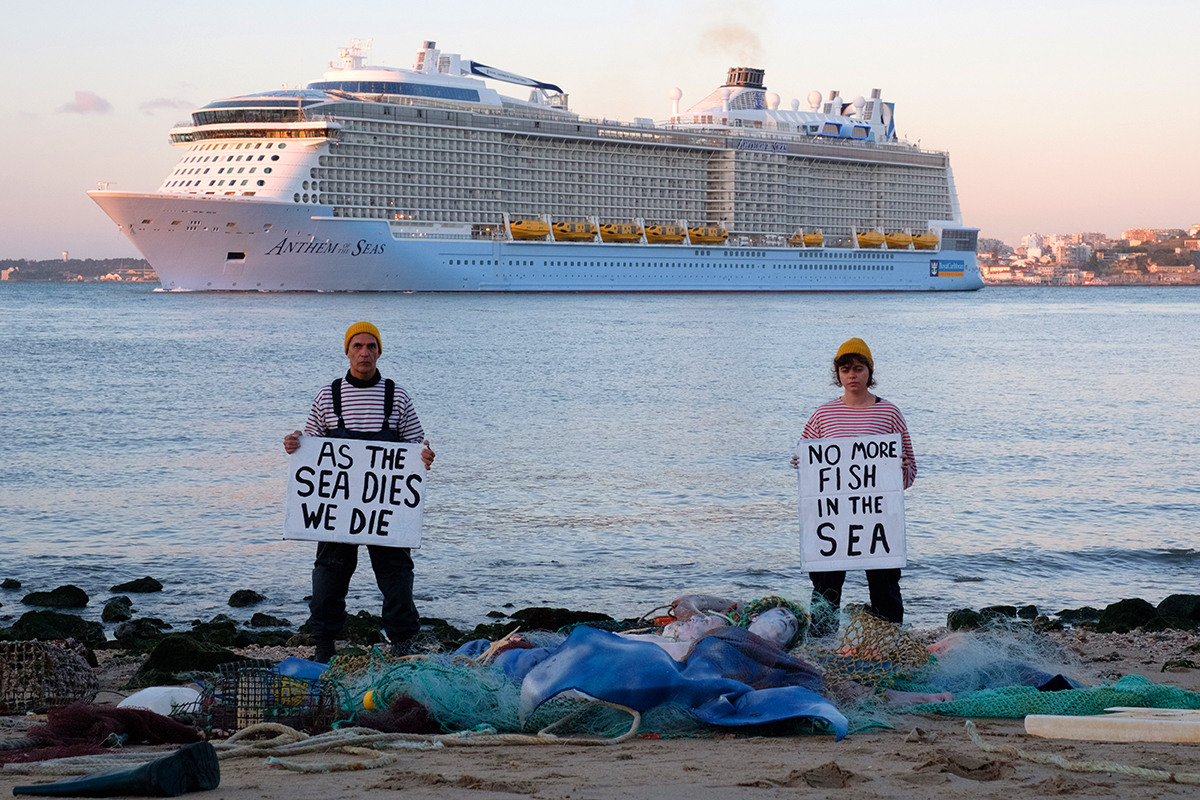2022 UN OCEAN CONFERENCE LISBON
27.06.2022
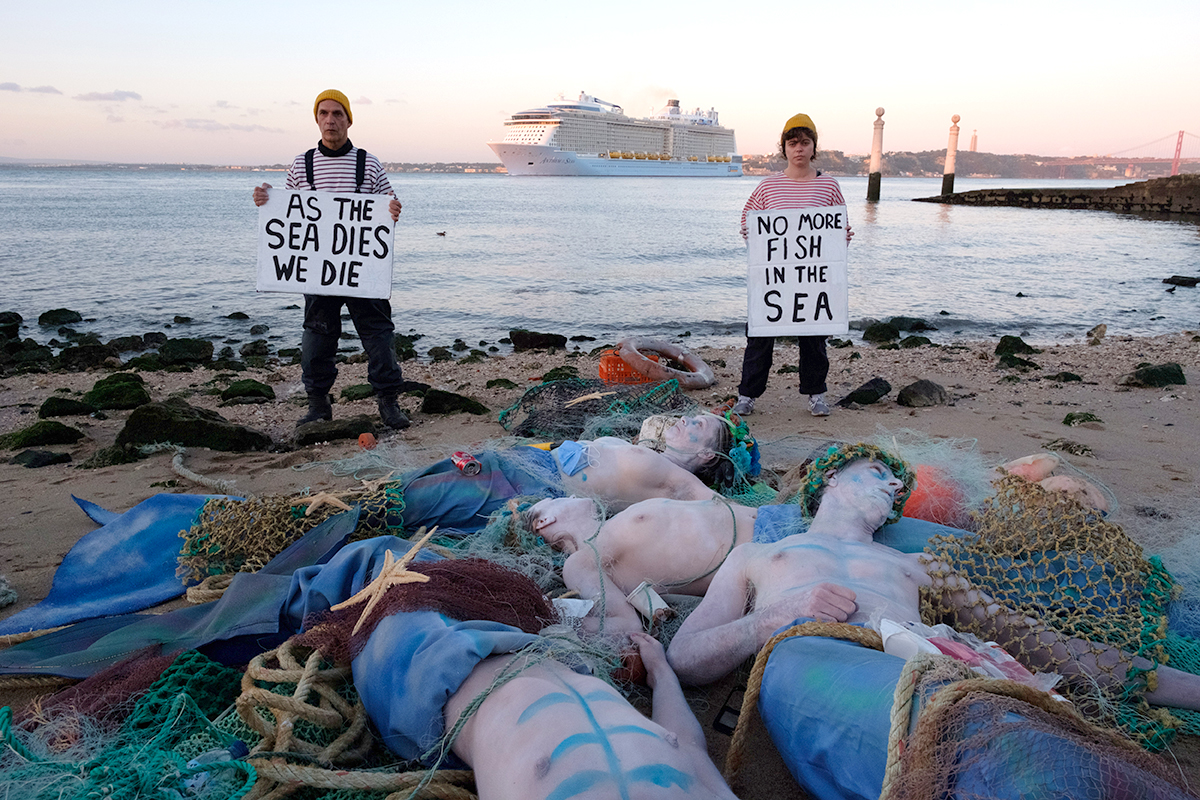
This morning, with the cruise ship ‘Anthem of the Seas’ polluting the horizon, the first day of the United Nations Ocean Conference dawned.
As the sun rose Ocean Rebellion bore witness as a pod of ‘Merpeople’ washed up on a beach close to the conference centre. Ocean protectors stood and watched as the merpeople died. Witnesses say the merpeople were travelling to the conference to make a desperate, last-minute plea to world leaders to keep the Ocean alive when a trawler entangled them in its nets. The by-catch ‘Merpeople,’ complete with tails and crowns made of sea litter, lay dead or dying, washed up and choked by industrial fishing nets.
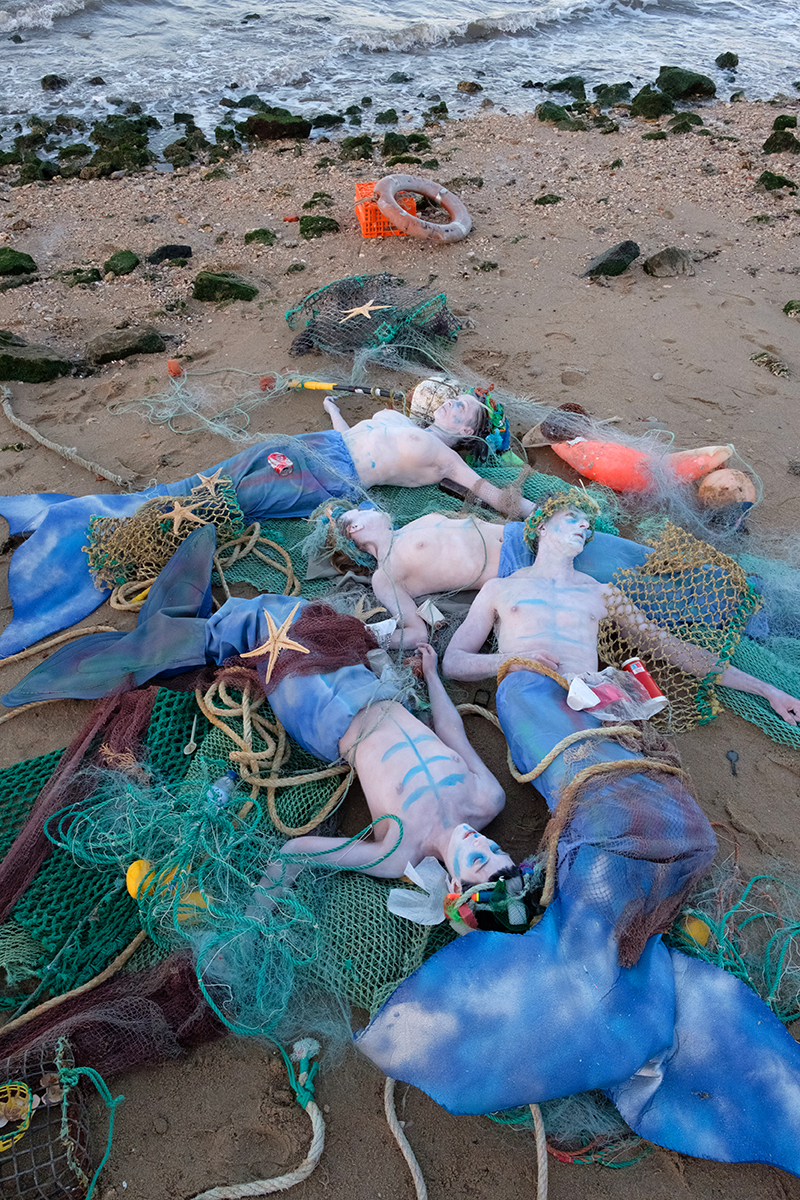
The performance is taking place after the recent round of negotiations for a new High Seas Treaty ended without agreement. This means ten years of negotiations have failed to produce a result. The world’s largest ecosystem, covering over two-fifths of the earth’s surface, is still unprotected and is dying.
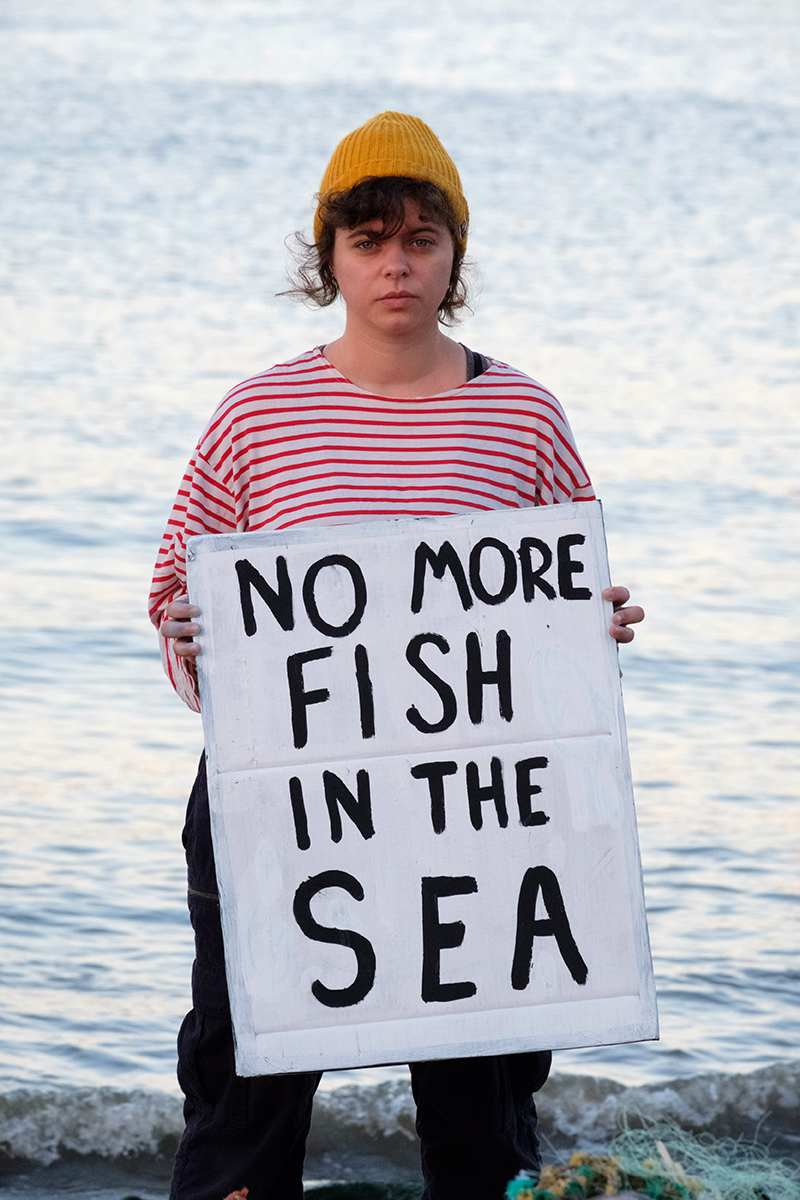
All life is connected to, and by, the Ocean.
The death of the Ocean is the death of magic, the magic of our imaginations.
The Merpeople represent the ‘death of magic’ by their entanglement in our cruel industrial fishing methods. They help reconnect us to our childhood wonder of the Ocean and warn us this wonder will soon be lost. They tell the truth about what will happen if we do nothing and continue with business-as-usual – there will be no more fish in the sea.
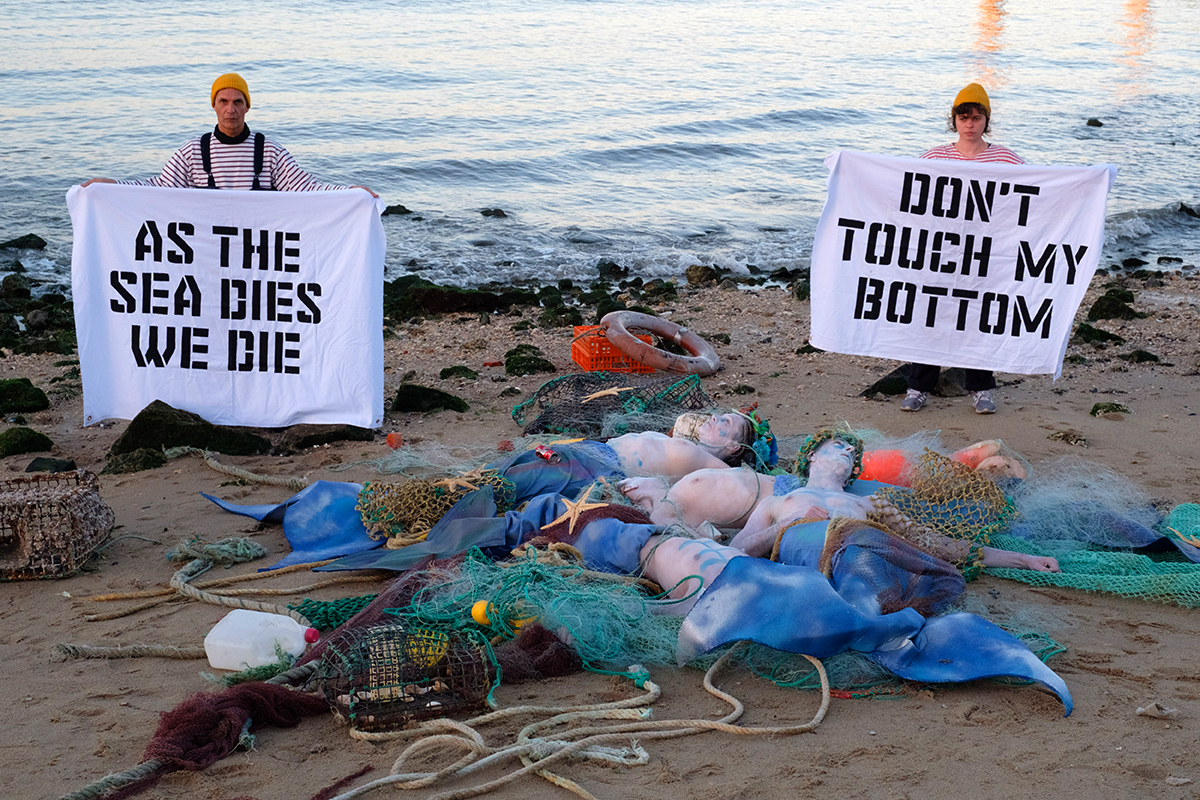
BOTTOM TRAWLING
Imagine the damage a net bigger than a jumbo jet does as it drags across the seabed. Catching everything in its path (whatever that might be), it destroys marine habitats and releases the ‘blue’ carbon stored there. Also, nets break. And when they do, they are cut free to float across the Ocean killing anything that gets tangled up in them. After they break, another is ready to go, continuing the death toll.
If the destruction of the wildlife and habitat isn’t bad enough in itself, there’s the sheer waste—scientists have estimated that bottom trawlers throw away about 50kg of fish for every kg that arrives on land. This is known as bycatch and this environmental slaughter is built into the Bottom Trawling business model.
Humanity has declared war on fish and we’re winning. The Ocean is so depleted that small fishing communities are on the edge of survival. Areas once of plenty are now empty.
Industrial fishing wrecks local fishing
Bottom Trawling is estimated to emit more CO2 than global aviation
CO2 stored in the oceans is known as Blue Carbon. This is carbon stored in seabed sediments, marine habitats and the fish caught there. When the seabed is damaged by bottom trawling, this blue carbon is released, switching the seabed from a carbon sink to a source of CO2 and of methane (CH4), a much more potent greenhouse gas. Blue Carbon is also stored in marine animals, so fish taken out of the sea also add to Blue Carbon release. If this figure were included in carbon footprint calculations, it’s likely that the actual footprint of some bottom trawled seafood would be even higher than any other food, including beef. All this contributes to ocean acidification which is threatening to eradicate marine life, especially those with skeletons or shells, in the relatively near-term. Countless marine species are now threatened with extinction.
Industrial fishing vessels release 159 million tonnes of CO2 each year from the fuel they burn. This is equivalent to the annual amount of CO2 emitted by 40 coal-fired power plants.This figure has risen four-fold since 1950 estimates. Industrial fisheries benefit from government fuel subsidies worth an estimated US$7.7 billion a year. Fossil fuel subsidies for bottom trawling should be redirected to support a transition to low-impact fishing.
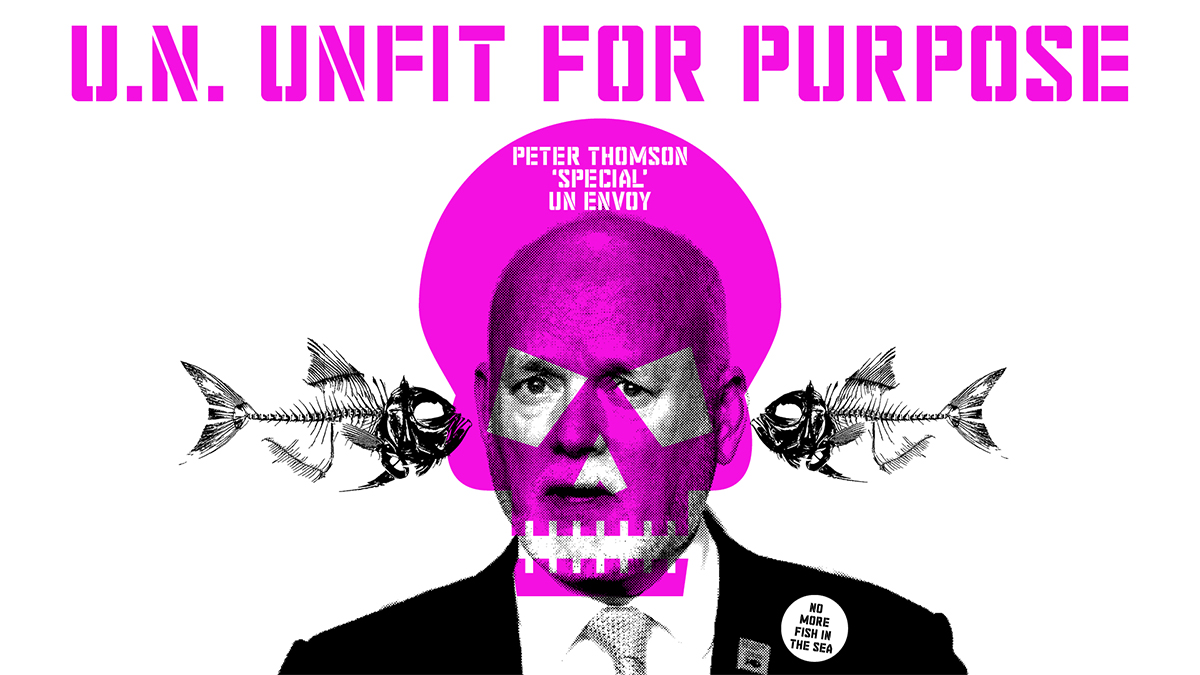
THE TIME FOR TALKING IS AT AN END. ONLY ACTION COUNTS
It’s all very well for the UN to make statements like ‘Sadly, we have taken the ocean for granted, and today we face what I would call an ocean emergency’ but talk is cheap. Ocean Rebellion calls on Peter Thomson, UN Special Envoy for the Ocean, to step up. Call for an end to bottom trawling now, make real plans to reduce fishing by 80% by 2025 and help struggling coastal communities to protect the Ocean they cherish and understand. And if you can’t do this, admit it. Stop the pointless talk and geopolitical gaming, tell the truth and start real change. Call out the companies and governments who are obstructing the saving of the Ocean, and name the implications of what they are trying to achieve. We need the Ocean to thrive again, as the sea dies we die.
OCEAN REBELLION DEMANDS:
The UN must form a new, transparent, and representative body to govern the Ocean for the benefit of ALL life. This new body must have the restoration and replenishment of the Ocean as its only measure of success. It should replace corporate power with people power. And it should represent the many forms of marine life who actually make the ocean a home.
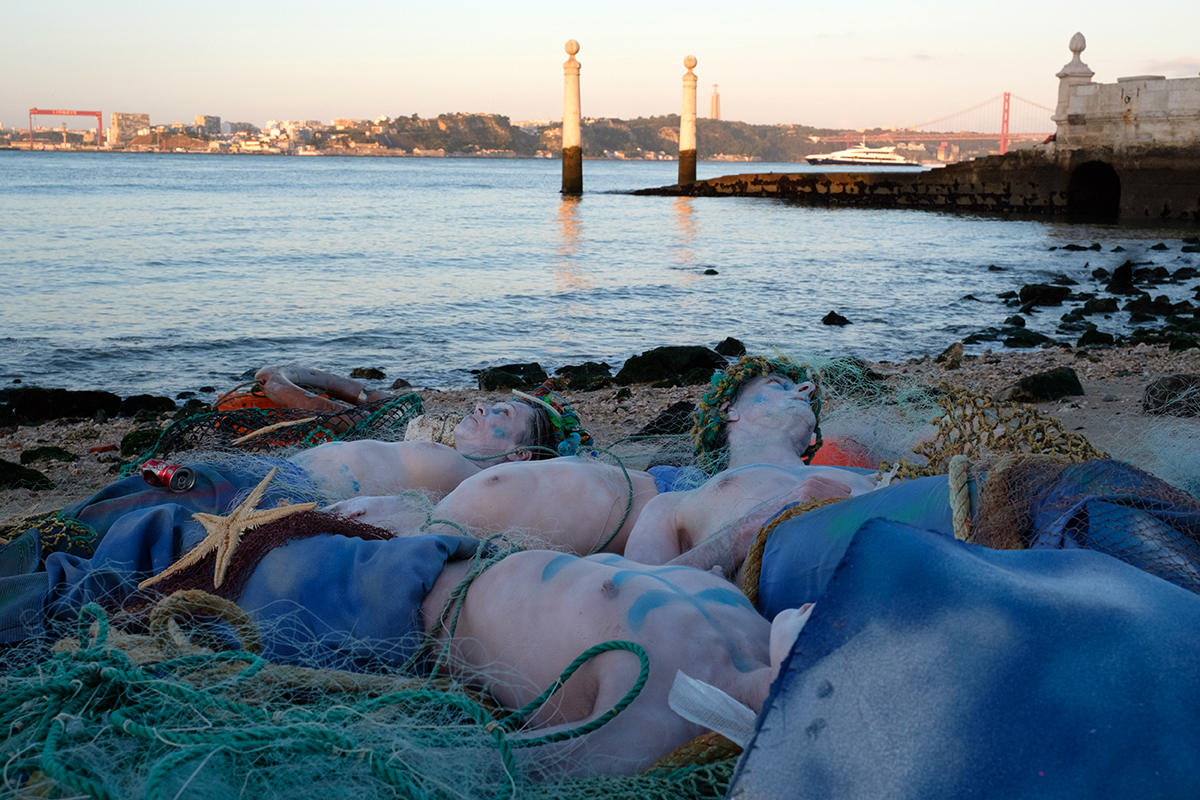
Sophie Miller says:
“The Merpeople represent the ‘death of magic’ by their entanglement in our cruel industrial fishing methods. They help reconnect us to our childhood wonder of the Ocean and warn us this wonder will soon be lost. They tell the truth about what will happen if we do nothing and continue with business-as-usual – there will be no more fish in the sea.”
Rob Higgs says:
“Humanity has declared war on fish and we’re winning. The Ocean is so depleted that small fishing communities are on the edge of survival and areas of former plenty are now empty. Over 100 million people rely on inshore subsistence and small-scale artisanal fishing for their daily food and livelihood − often using the same waters targeted by bottom trawlers. It’s a no-brainer to ban bottom trawling both on climate breakdown and nature breakdown grounds. Climate breakdown and nature breakdown are effectively the same thing and both have to be stopped now.”
Chris Armstrong adds:
“The governance of the High Seas is an ecological disaster. Its founding principles were dreamt up in a time when we thought the ocean’s bounty was inexhaustible, and its ecosystems too robust to ever fail. We have now pushed that idea beyond breaking point. We urgently need a revolution in High Seas politics, with protection and participation replacing corporate pillage.”
Suzanne Stallard adds:
“The UN talks a great talk. The International Maritime Organisation and International Seabed Authority, both UN bodies, are unfit for purpose. Both are totally corrupted by industry and both govern the Ocean on behalf of industry. We are living in an age of unprecedented ecological breakdown, the UN must recognise this by governance not just in words. We ask the UN to call out its rogue subsidiaries, more harmful to life on earth than rogue states.”
Roc Sandford adds:
“As the seas die, we die, and the seas are dying. If the collapse of marine biodiversity is not halted immediately, release of blue carbon currently sequestered in the oceans will accelerate climate breakdown and condemn countless people to an agonising death. We must rush reforms of the existing UN ocean-focussed structures, currently criminally unfit for purpose, whilst simultaneously building a new and effective ocean governance body to take their place. It’s now or never. I don’t understand why everyone isn’t screaming, given what we know about what is happening in the Ocean.”
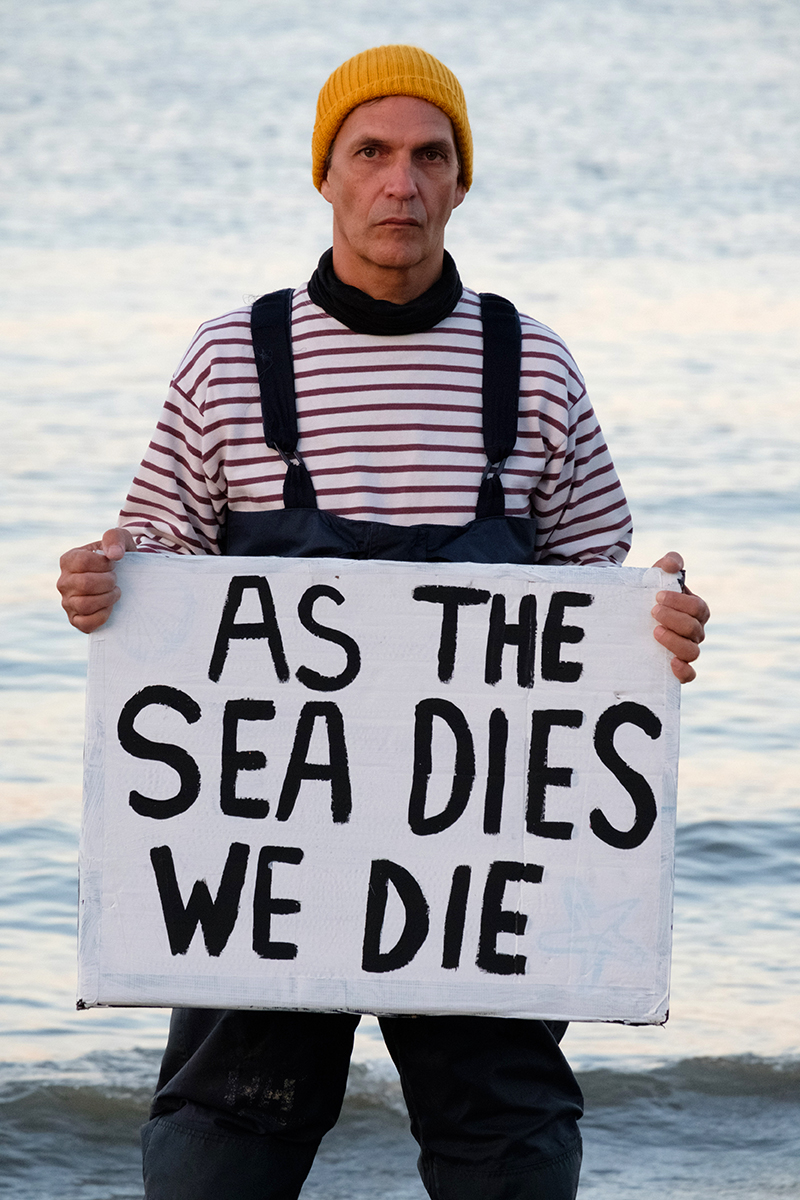
Photos: João Daniel Pereira.
